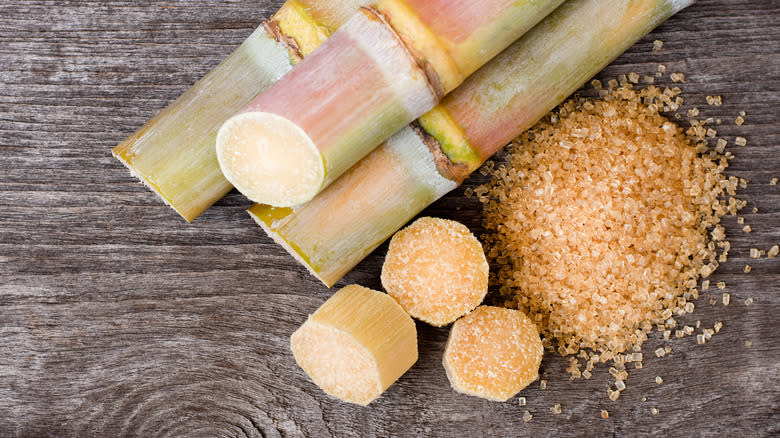What Is Sucanat Sugar, Anyway?

Sucanat — a portmanteau of the phrase "sugar cane natural" — is a type of unrefined, minimally processed cane sugar, touted in some circles as a healthy alternative to granulated sugar. Both are made from the juice of the sugarcane plant; however, granulated sugar undergoes extensive chemical and mechanical processing, while sucanat is made with minimal mechanical processing and no chemical additives. To understand why this makes such a big difference in nutritional content and taste, let's take a closer look at how these two types of sugar are made.
After sugarcane juice has been pressed and strained, sucanat is made by boiling that juice to evaporate the liquid, leaving behind a thick syrup that's paddled until it's cool, dry, and crystallized. The result is a coarse, natural sugar that's golden brown and flavored with molasses — the sweet, nutrient-dense byproduct of sugar production. As such, sucanat retains many of the sugarcane's minerals, trace elements, vitamins, and mineral salts.
To make granulated white sugar, on the other hand, sugarcane juice is chemically clarified before being boiled. The sucrose crystals that form after the juice is heated are then mechanically removed from the molasses and further refined, essentially stripping them of any nutritional benefit.
Read more: 12 Little-Known Facts About Salt
Sucanat Differs From Granulated Sugar In Both Taste And Nutrition

Because of the differences in how sucanat and granulated sugar are processed, the two differ on a molecular level. Granulated sugar consists almost entirely of sucrose, while sucanat contains sucrose, fructose, and glucose. Not only is glucose essential for healthy brain function, but because sucanat is less processed than granulated sugar, the body can digest it more slowly than sucrose, which tends to cause a spike in blood sugar.
These molecular differences can also have a subtle effect on sucanat's taste. Containing 99% sucrose, granulated sugar tastes more overtly sweet than sucanat, with the sweetness lingering longer on your tongue. Because sucanat also contains a significant amount of molasses, it often has a robust, smokey, almost raisin-like taste that's more complex than regular table sugar. Regardless of the differences in taste, many people use sucanat as a sugar substitute in cooking and baking or stirred into coffee and tea.
Read the original article on Mashed.

